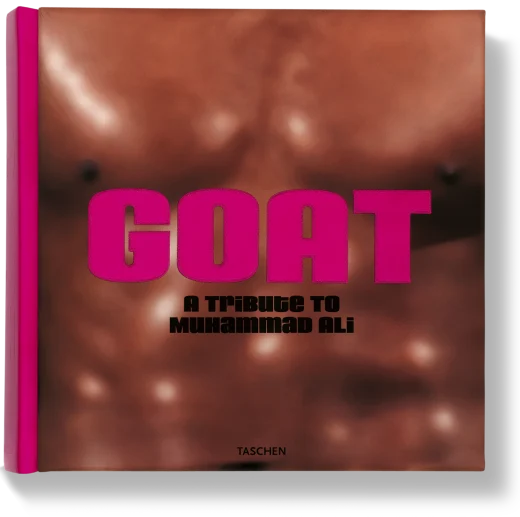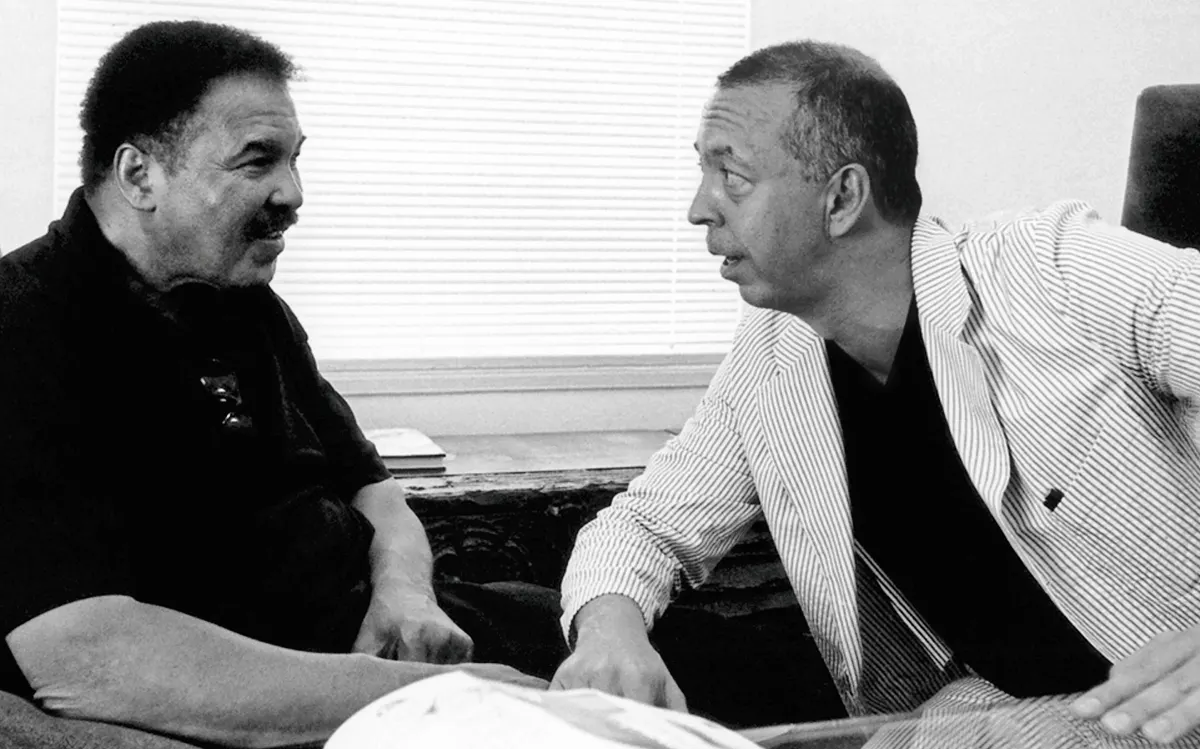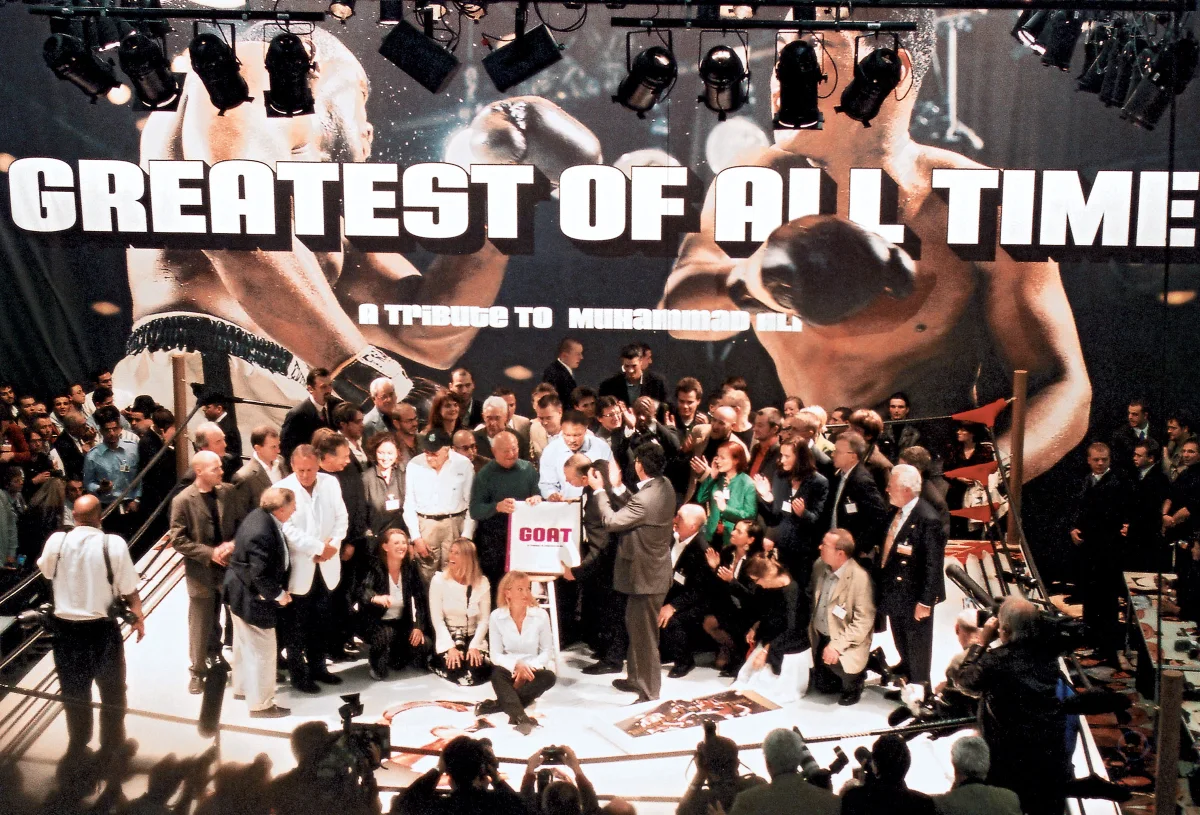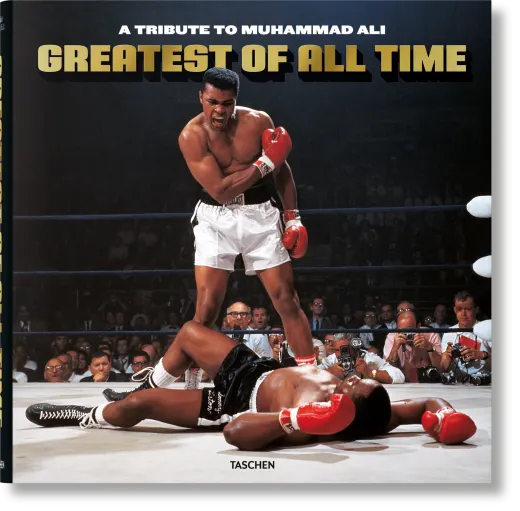
GOAT – Greatest of All Time
Four years later
“What also struck me about Ali was his huge emotional intelligence; he somehow had the instinct to make the right decisions about himself every time, and often did so against the best advice of even those closest to him, never mind the norms of society.” —Benedikt Taschen
Image: Ali visiting the TASCHEN offices on Sunset Boulevard, Hollywood, California in September 2003. Photo © Howard L. Bingham
From early childhood, Ali was my hero. Why exactly, I didn’t know. Like many others of my generation, I remember watching the first fights broadcast live, which for me, my father, and my family, was during the middle of the night. It was all very exciting, being woken up just to watch a fight on TV, although at that time I didn’t understand much about it, especially why the man had two different names.
Later, when I was 16 years old, I read his autobiography The Greatest, and then, another 20 years after that, I saw him at the Olympic Games and watched Leon Gast’s award-winning documentary, When We Were Kings. It was then that I began to understand why I was so fascinated by Ali: The man was cool, always dressed immaculately, charismatic, had a great sense of humor, a phenomenal joie de vivre and, more than anything else, he did exactly what he wanted and was right.
His fighting aroused emotions in me comparable to the kind a great scene in an historical movie can evoke, but he did it the whole time, throughout the entire fight, fight after fight. And it wasn’t only me who was under his spell—little children, girls, my mother, my grandmother, not to mention boys and men everywhere. And despite his illness, he didn’t give up. On the contrary, with the Olympic torch in his hand, in one swift go, he conquered the hearts of anyone still waiting to be won.
In the 90s I had yet another revelation: the publishing house was beginning to become rather established and in the fall of 1992 we planned to publish a catalogue raisonné of Salvador Dalí’s paintings. As always, we produced a dummy to present the book to the trade. At that time we still used stickers to apply the title of the book to the slipcase and, as it was summer and the temperature high, the “D” happened to come off, suddenly leaving the title to read “ALI,” which made me think…
Then I remember being in Tokyo and reading about Ali’s plans to open a Center in Louisville and immediately thought if I was ever to do a huge book like Helmut Newton’s SUMO again, I would do it on Ali. I knew this was going to be a unique historical opportunity that I had to capture right there and then. At the time Ali was still in his fifties, but in the collective memory of the entire world he was a living legend—maybe the only one—and most of his original entourage were still around. Shortly afterward I spoke to Ali’s manager, Bernie Yuman, who, since the beginning, has also managed Siegfried & Roy in Las Vegas. He was familiar with our Newton book and the publishing house, and understood at once what I had in mind: a book unlike any other.
A book the entire world would remember for generations to come, one that would chronicle a man whose prominence would be felt as strongly one hundred years from now as it is today.
To make things a little more complicated, I asked my friend Jeff Koons, an icon of pop culture in his own right, how he felt about contributing a piece of art to the project. I thought about how it would be today if Marilyn Monroe had collaborated on a book with Salvador Dalí, or Elvis Presley with Andy Warhol. Koons was completely into the idea and created a fantastic piece that will accompany the first 1,000 copies.
Four years have gone by and I am truly happy that we’re there. I must have looked at several million photographs of Ali in archives all over the world. I went to see hundreds of photographers, journalists, writers, spoke to his ex-opponents, his managers, his lawyers—everybody I could think of. I have also worked my way through and analyzed the entire Ali literature.
Some twenty people have been incessantly involved with me on this journey, plus 15 additional contributors who have written essays on various Ali related topics and conducted interviews with key players in Ali’s world. All in all, an amazing experience. So, let Ali, Allah, and the rest of the world assist us.
Benedikt Taschen
“It was only years later—in the midst of the Iraq conflict— that I truly began to appreciate how bold a step it was for a young black man and more than that, a superstar in his prime in mid-60s America, to go his way against the conservative, majority view and to stand up for his right not to fight in Vietnam.” —Benedikt Taschen
Image: The GOAT team, including Muhammad Ali and his wife Lonnie, Howard L. Bingham and Neil Leifer, Angelo Dundee, Hank Kaplan, Leon Gast, at the world’s largest book fair, at Frankfurt in October 2003.
Publishing News, London, declared: “GOAT… transformed Hall Four into Madison Square Garden.”




